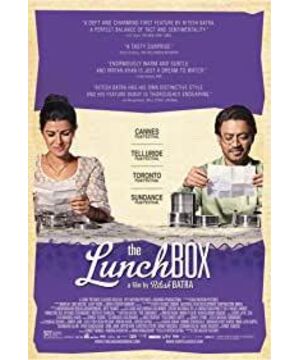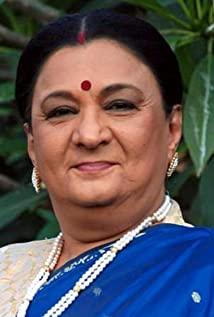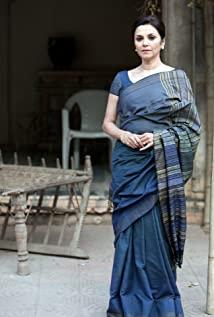And the most representative of the most recent Indian low-cost literary and artistic films is "Lunch Box" (2013), which won the Grand Prix at the Cannes Film Festival last year. The time is full of flashy songs and dances, and there is also a lack of life-and-death love popular dramas. The lunch box that a housewife carefully cooked and consigned to her husband who went to work in a different place was sent by mistake. It was in the hands of a middle-aged widowed man who was about to retire. The housewife began correspondence with the man who had never met, expressing her affection. , It also brings out his thoughts and desires about family, life and love.
Compared with mainstream Bollywood blockbusters, the pace of the film is extremely slow, but the urban scenes and life details of the shooting are rich and steady, plain and moving. The young woman Ina cooks for her husband, and the aunt upstairs hangs delicious spices from the window with a basket and teaches him to cook for lunch. This strong mother-in-law who has never appeared in front of the camera and only makes a sound from the window (for caring for her vegetative husband) ), at a critical moment in life for Ina, is an all-knowing and almighty "behind-the-scenes" hero in the film, and it is the spices she gave to Ina that make the original ordinary lunch glow unique and delicious, when you take the wrong lunch box After the accountant Ferrandi opened it, he was very surprised by the deliciousness. This magical spice, threading a needle, became a clue to the emotional connection between Ina and Ferrandi. The lunch lost the spice, suddenly became tasteless. This layer of sensitive taste information, in the case of Ina’s husband who did not receive the lunch. There, it is completely invalid, and the film also alludes to the marriage essence of Ina and his wife.
In addition to the narrative function of "Lunch Box", "Lunch Box" takes a calm perspective to take pictures of Mumbai's urban and rural areas. The shuttle train, the various people in the car, and even the daily ecology of Ferrandi's company, are deeply impressed by the viewer in the inadvertent movement of the camera. This is a realistic face that the dreamy Bollywood blockbuster cannot present. The lunch box is not only the emotional context of the two protagonists, but also presents the contemporary Indian social space outside the screen during its circulation. This set of lunch delivery services is called "dabbawal" (dabbawal), which is a kind of lunch delivery service with very Indian characteristics. Its origin can even be traced back to the British colonial period more than 100 years ago. It is extremely accurate The rate ensures that the lunch prepared by the family is delivered to the diners efficiently and quickly. The pair of lonely men and women who had never met before, because of a very low probability of mis-delivery, began correspondence. The script is meticulous, and the shooting is not out of the ordinary. The new director Lai Shu Picha carefully photographed the entire process of Dabavaara’s meal delivery, and delicately shows the interpersonal relationship in the film: Ferrandi faces the young man who came to replace him. , From repulsion to heart-to-heart, in contrast to the closeness of the soul that communicates with Ina, the progress of the relationship between characters mostly depends on the environment, train, office, etc., and to some extent, "Lunch Box" is about human affection. , It is more about the human relationship of ordinary people, plain and rich, naturally natural, this is the most rare part of this "delicious love letter". Some critics pointed out that the film was shot for European art film standards, and the details are so precise that it fits the development of the narrative. Achieving the moving power of "Lunch Box", any film grammar is a means, in the final analysis is the effect, "Lunch Box" in a universal sense, reached the high level of a small-cost literary film.
It can also be seen from "Lunch Box" that contemporary Indian "small movies", while filling the aesthetic fatigue of blockbuster films, also consciously or unconsciously assume the carrier function for conveying contemporary Indian social ecology and culture. "Lunch Box" is important for food delivery. The system "Dabawala" can be regarded as a display that spares no effort. It is this characteristic of India or Mumbai that is an excellent channel to show the world its existence and characteristics. Through the delivery of meals, it is a perspective of women making lunch for their husbands in order to grab the stomach. The mentality of being with the heart is also a reflection of the current Indian marriage relationship, and the transportation procedures that Daba needs to go through during the transportation, such as bicycles, trains, delivery order, and the shape and specifications of the lunch box itself (the common specification is round The repeated display of the four-frame cylindrical installation is all in the image transmission of a set of real Indian social customs. It is difficult to establish an image in the audience’s mind in a conventional text introduction, but it is based on stories and objects. , It is easier to convey the image of "Dabawala" to the world. In another low-cost film "Passing Dragonflies", which the author is also appreciative of, the cultural landscape of North Bengal and Kolkata shown through the growth of problem teenagers is also the most surprising and beautiful outside the story. The lens can't cover up the mediocrity of the ordinary world. It is the secret and interesting charm of this more timeless film. At the same time, it is also the bright color of the small Indian literary film from the mainstream commercial film that is more and more like a large-scale MV. Of course, Bollywood is also very worthy of appreciation, but if the audience wants to see a relatively objective and real (even documentary, there is no absolute objectiveness) and stereotyped India, Bollywood blockbusters are usually disappointing.
"Beijing Youth Daily" 2014.9.23
View more about The Lunchbox reviews











